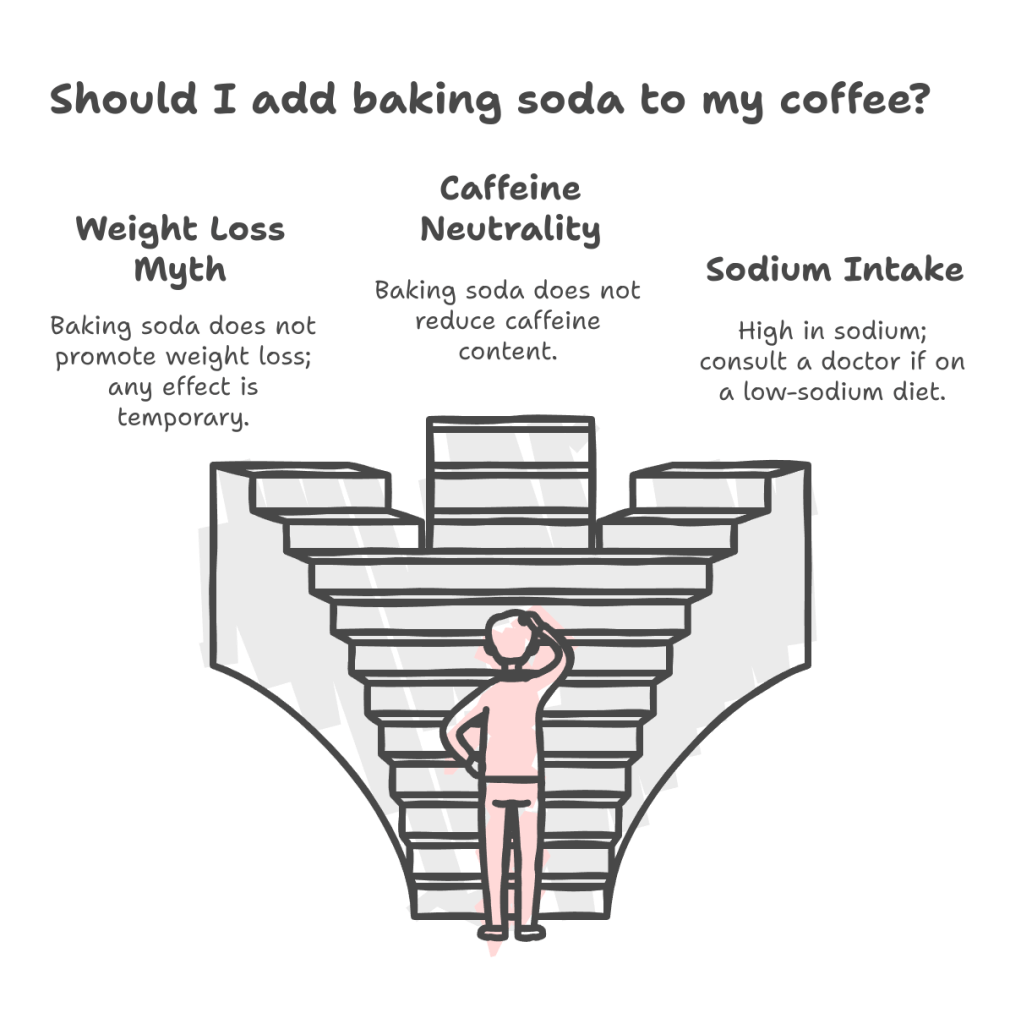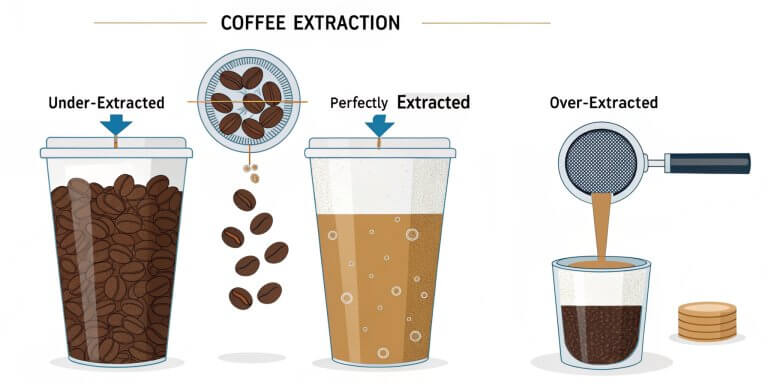
You know that feeling? You wake up excited for your first cup of coffee, but then—bam—that familiar burn hits your stomach. Ugh, coffee acidity! It happens to the best of us. Beyond a smoother taste, did you know your morning brew can offer metabolic support from coffee? What if I told you there’s a simple trick using something you probably already have in your pantry that can help? Yup, we’re talking about baking soda!
Believe it or not, adding baking soda to your coffee can make a big difference. It can smooth out that harsh, bitter edge and make your coffee more straightforward. Sounds kinda crazy, right? Stick around, and let’s dive into how this little kitchen hack works!
The Science of Baking Soda and Coffee
Alright, we’ve established that baking soda can work magic on coffee’s acidity, but how exactly does it do that? Let’s break it down so that even your non-coffee-loving friends can understand.
It’s all about pH! Remember that scale from science class that measured how acidic or basic something is? Coffee is naturally acidic – its pH usually sits between 4.85 and 5.10. But it’s also rich in coffee antioxidants, those powerful compounds that fight free radicals. When baking soda enters the mix, it neutralizes acidity without stripping away those beneficial antioxidants.
Now, when these two meet in your coffee cup, a chemical reaction happens. The baking soda, being a base, wants to neutralize the acids in the coffee. Imagine them as tiny warriors battling it out – the baking soda swoops in and reduces the overall acidity of your coffee. This reaction produces water, salt, and even some carbon dioxide (which explains the little fizz you might see). As a result, the pH level of your coffee goes up, making it less acidic. Voila! A smoother, less harsh cup of joe that’s way gentler on your tummy.
Benefits of Adding Baking Soda to Your Coffee
Okay, so we know the science behind it, but what does adding baking soda to your coffee do for you? Turns out quite a lot!
Smoother, Less Bitter Taste
Remember how we discussed coffee’s acidity creating that bitter, sometimes harsh taste? Baking soda swoops in to save the day by neutralizing some of those acids! This results in a smoother, more balanced flavor profile. Think of it like turning down the volume on the bitterness, allowing the subtler, more nuanced flavors of the coffee to come through. Your coffee tastes a bit sweeter without adding any sugar!
Easier on the Stomach
Let’s be real—a lot of us turn to coffee for a boost, but sometimes, that boost comes with a side of heartburn or an upset stomach. Coffee’s acidity can irritate our digestive systems, leading to uncomfortable symptoms. But here’s where baking soda shines—by neutralizing some of that acidity, it makes coffee less likely to trigger heartburn, acid reflux, or indigestion.
Potential Health Benefits (With Cautions)
Some sources suggest that baking soda in coffee could have other health benefits of coffee, like helping to lower uric acid levels, which might be helpful for folks dealing with gout. However, it’s important to remember that more research is needed to confirm these benefits.
Important Note: This information is not a substitute for medical advice. If you’re considering using baking soda for any health reason, it’s crucial to talk to your doctor first. They can give you personalized guidance and ensure it’s safe for you.
How to Add Baking Soda to Your Coffee
Alright, are you ready to try this baking soda coffee magic? Here’s a simple guide to get you started.
Start Small, Adjust to Taste
When it comes to baking soda, a little goes a long way! Starting with a tiny pinch (about 1/16th to 1/8th of a teaspoon) per cup of coffee is best. You can gradually increase the amount until you find the perfect balance for your taste buds. Remember, you don’t want to overdo it and end up with a salty or soapy flavor.
Methods of Addition
There are two main ways to add baking soda to your coffee:
- Adding to coffee grounds before brewing: This method is excellent for even distribution and works well with drip coffee makers or pour-over methods. Mix a pinch of baking soda with your grounds before brewing.
- Adding to brewed coffee: If you prefer more control over the amount of baking soda or want to try it out with a single cup, you can add it directly to your brewed coffee.
Tips for Even Distribution
- Stir, stir, stir! Whether you add baking soda to the grounds or the brewed coffee, stir thoroughly to ensure it dissolves completely.
- Use warm water for brewed coffee. If you add baking soda to your brewed cup, warm or hot water will help it dissolve more easily.
And that’s it! Experiment with these methods and find what works best for you. Happy brewing!
Baking Soda and Different Coffee Types
Now that you’re a baking soda in coffee pro let’s get a little more nuanced. Did you know that baking soda might have different effects depending on the type of coffee you’re using?
Impact on Roast Levels
Remember how different roast levels affect the acidity of coffee? Lighter roasts tend to be more acidic, while darker roasts have lower acidity but might be more bitter. So, how does baking soda play into this?
- Light roasts: Light roasts are more acidic, so you might need more baking soda to neutralize that tang. But be careful – too much could throw off the delicate flavor balance.
- Medium roasts fall somewhere in between, so a pinch of baking soda is just right to smooth things out without masking the flavors.
- Dark roasts: Since dark roasts already lower acidity, adding baking soda might be more about taming bitterness than reducing acidity. In this case, a smaller amount might be all you need.
Effects on Single Origin vs. Blends
Single-origin coffees have unique flavor profiles reflecting the region where the beans were grown. Blends, on the other hand, combine beans from different origins to create a more complex flavor.
It’s possible that baking soda could more noticeably affect the delicate nuances of a single-origin coffee than a blend. However, this would require some experimentation and taste testing to determine.
Baking Soda and Brewing Methods
Like roast levels, different brewing methods can also affect coffee’s acidity and overall taste. It’s worth considering how baking soda interacts with your favorite brewing method.
- French Press: This method produces a full-bodied, rich cup of coffee. Adding baking soda could affect the extraction process, potentially leading to a slightly weaker brew.
- Pour-over: This method produces a clean, bright cup that highlights the nuances of the beans. Adding baking soda could alter the delicate flavor balance of a pour-over, so it’s best to experiment cautiously.
Ultimately, the best way to figure out how baking soda affects your coffee is to try it out and see what you like best! Keep a coffee journal, track your experiments, and soon you’ll be a baking soda coffee connoisseur.
Baking Soda Alternatives For Coffee Acidity
If you’re looking to reduce the acidity in your coffee but aren’t keen on using baking soda, you can try a few other tricks.
Choosing high-quality coffee beans is a great place to start. Different factors like growing conditions, processing methods, and roast levels affect a coffee’s acidity. Darker roasts tend to be less acidic than lighter roasts. Look for beans labeled as low-acid or try a cold brew, which is naturally less acidic due to the brewing process.
A pinch of salt can also help to reduce bitterness and enhance sweetness in coffee. This works because salt can help balance the flavors and make the coffee taste smoother. Try adding a tiny pinch of salt to your coffee grounds before brewing or directly to your brewed cup.
Another surprising alternative is eggshells. They are a natural calcium source that can help buffer coffee’s acidity. To use eggshells, clean and crush them, then add them to your coffee grounds before brewing. The eggshells will help neutralize some of the acids and create a smoother, less acidic cup of coffee.
Debunking Common Myths and Addressing Concerns
Let’s clear up some misconceptions about baking soda in coffee:
- Baking Soda and Weight Loss: Adding baking soda to coffee does not promote weight loss. Any perceived weight loss is likely due to temporary water loss from baking soda’s diuretic properties, not actual fat loss.
- Baking Soda and Caffeine: Baking soda does not neutralize or reduce caffeine content. It primarily affects the acidity and taste of coffee.
- Sodium Intake Considerations: Baking soda is high in sodium. If you’re on a low-sodium diet, it’s essential to consult with your doctor before adding baking soda to your coffee.

Conclusion
Adding a pinch of baking soda to your coffee might sound unusual. Still, it can be a game-changer for those seeking a smoother, less acidic, and more enjoyable coffee experience. Baking soda neutralizes coffee’s acidity, making it gentler on the stomach and potentially reducing the risk of heartburn or acid reflux. This simple trick can also reduce bitterness and enhance the subtle flavors of the beans, allowing you to appreciate the nuances of your favorite brew even more.
However, it’s crucial to use baking soda in moderation and be mindful of its sodium content. The key is to start with a small amount and gradually adjust to your taste.
Experiment with different coffee types, roasts, and brewing methods to find the perfect balance. Ultimately, the goal is to enjoy your coffee mindfully, savoring its taste and potential benefits.






